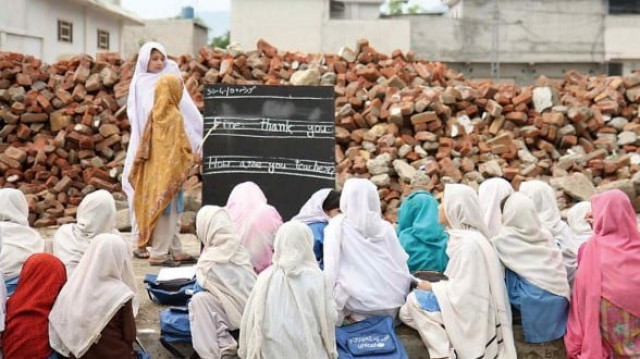Spirit of defiance at school amid terror threats
Girls are determined to study, despite the rise in attacks on institutions.

Spirit of defiance at school amid terror threats
“I want to be a lawyer when I’m older,” said Kainat Aman, a student in the eighth grade at the Government Girls High School in Landi Arbab, Peshawar.
Despite two attacks on her school last year and a planted bomb that was defused enrolment is up. Parents in the nearby areas appear determined to continue their daughters’ education.
There have been a number of attacks on schools in Landi Arbab. Some received threatening letters from the Tehreek-i-Taliban Pakistan (TTP). The state of education in the province and the Federally Administered Tribal Areas (Fata) has received a huge blow, after militants targeted schools and colleges.
On March 1, 35 girls were injured when grenades were lobbed into a college for women in Mardan. Floods and militancy have seen 1,896 schools destroyed in the province, and 200 schools still remain closed. In Malakand Division, 367 schools were partially damaged and 273 were completely destroyed. As many as 73 educational institutions have been destroyed over the past year alone in the Mohmand Agency in Fata. “These attacks are against our cultural and social norms,” says the provincial minister for education Hussain Babak. “It is our tradition that enemies do not attack women and children. These are acts of cowardice. They may be attacking our children but they cannot defeat our commitment to education.”
Educationists are under threat as well. Ajmal Khan, the vice-chancellor of the Islamia College University, has been in captivity since September. The vice-chancellor of the Kohat University of Science and Technology Dr Lutfullah Kakakhel was freed last June after over six months in captivity. Dr Farooq Khan, the vice-chancellor of the Swat Islamic University, was assassinated by Taliban in October.
Despite this, the mood at this school in Landi Arbab is upbeat and defiant.
“I am not scared,” says Azmat Sultana, who has taught at the school for 10 years. “We have become used to this.”
“Whether anyone goes to school or not, my daughter is always there,” says the school’s watchman Asmatullah. He guards the school at night, armed with a Kalashnikov. But he cannot detect planted bombs, left by unknown individuals at night.
“This school is like my home,” he says. “We will defend it. But more people should be on night duty and the building’s walls should be raised.”
Hussain Babak said it is not logistically possible to deploy policemen outside every school, given the ratio of security forces to the population.
With the damage caused by floods and militancy, school enrolment increased by a bare 0.1 per cent over the past year in Khyber-Pakhtunkhwa.
“Previously, we used to be scared,” says 13-year-old Sara. “After a bomb blast, my mother would say: ‘don’t go to school’.”
More than 700 girls are enrolled at the school in Landi Arbab which was built in 1942. The school’s principal is determined. “We will make this a well-educated society,” she says. “These girls are of Pathan blood. They are not scared easily.”
Published in The Express Tribune, March 5th, 2011.













COMMENTS
Comments are moderated and generally will be posted if they are on-topic and not abusive.
For more information, please see our Comments FAQ